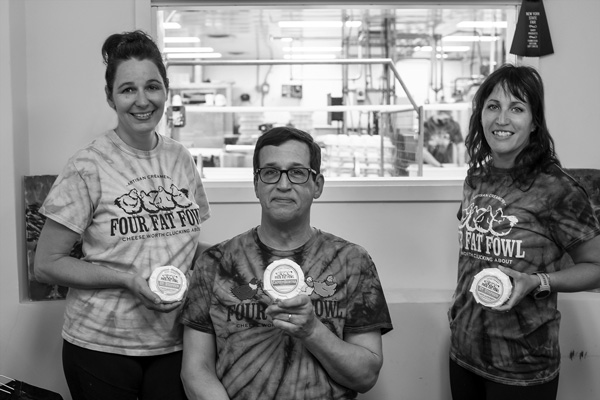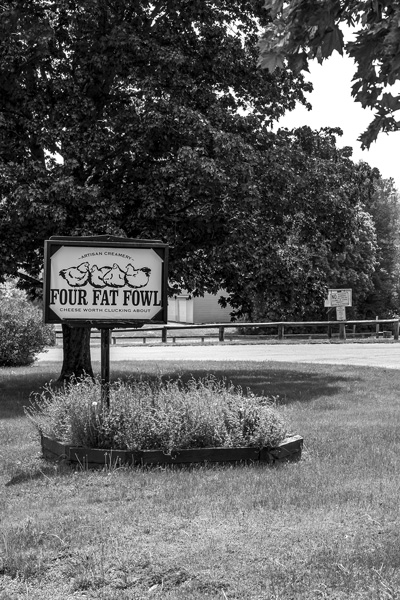News & Issues June 2023
Old school, rich cheeses
From Stephentown, Four Fat Fowl creamery builds a wide following

Partners Josie Madison, Willy Bridgham and Shaleena Bridgham started the Four Fat Fowl creamery a decade ago and now ship their cheeses to stores across the country. Joan K. Lentini photo.
By STACEY MORRIS
Contributing writer
STEPHENTOWN, N.Y.
A former elementary school, set back from Route 43 behind crabapple trees that were in full blossom last month, has been transformed into a center of small-batch cheese making.
The Four Fat Fowl creamery in Stephentown is the creation of a family of self-described “maniacal cheese lovers,” and the old school building is the place where they follow stringent standards to produce unforgettable artisan cheeses.
A decade ago, Willy Bridgham was a cheesemaker at Old Chatham Sheepherding Co., the pioneering local sheep’s milk creamery. Willy’s wife, Shaleena, managed the company’s sales. With Willy’s sister, Josie Madison, they had dreamed aloud — on family vacations and at the dinner table — about what it would be like to start their own venture.
So when new owners took over at Old Chatham (and ultimately shut down its local operations, shifting production to a facility in the Finger Lakes region), the trio knew the time was right to take the plunge.
From the start, they decided that the star ingredient of their cheese would be locally sourced milk and cream from Jersey cows, which produce a higher butterfat content than Holsteins. Their milk comes from Dutch Hollow Farm in the town of Stuyvesant, 24 miles to the west and just across the Columbia County line.
Willy had another goal in mind at the outset: to make an outstanding triple cream. Not only because it’s his personal favorite but also because, at the time, there were no triple creams made in New York state. The result was Four Fat Fowl’s St. Stephen cheese, the first of the three varieties they now produce.
“It’s basically a 1,000-year-old recipe that I tweaked from there,” he recalled. “I did about 20 test batches in our kitchen before we opened. And I sought out brutally honest testers with sharp taste buds to help me fine-tune the flaws and tell me what was needed.”
Today, the three partners each retain the roles they’ve had from the beginning. Willy oversees the cheese production, Shaleena handles the marketing and distribution, and Madison is the finance director, historian and overall trouble-shooter.
And as they’ve grown they’ve added three full-time employees: Justin Dupee and Jeff Wagner for cheese production, and Jennifer Legget, who wraps the triple cream and camembert wheels by hand for delivery to area retail stores and for cross-country shipment.

Honoring local history
It was Madison who came up with the company’s name after poring over books and documents relating to the region’s history. The name is a reference to the Dutch patroons who once controlled most of the land in the Hudson Valley and acted as landlords to the small farmers who settled in the region.
Stephen Van Rensselaer III, the last patroon of the land aggregate that is now Rensselaer County, was known for his kind-hearted, often lenient attitude when it came to collecting his rent, which Madison said included “a day’s labor, 10 to 20 bushels of wheat per hundred acres, and four fat fowl.”
“It’s a nod to a longstanding tradition in the artisan cheese industry of paying homage to your regional roots,” she explained. “But we also wanted our name to reflect our personalities, which are a little quirky, … and you can’t beat alliteration.”
Willy’s day begins at dawn with the milk pick-up at Dutch Hollow Farm. Four Fat Fowl pasteurizes 500 gallons of Jersey cow’s milk every other day. After the pasteurization comes the cooling, culture and addition of rennet for the coagulation phase.
Then the cheese is set into molds to sit overnight at 78 degrees to achieve the proper pH levels, which usually occurs within 24 hours or less. The next day, once the proper pH is reached, the cheese wheels are removed from their molds and set in a brine bath for about 30 minutes before being sent to the aging coolers for a two-week stay.
“We have a short aging process,” Willy explained. “When the mold is young, it has a nice, delicate flavor. You don’t want to go too far.”
As the company’s cache of local and national awards attest, Four Fat Fowl’s wares are simple cheeses that have built a national fan base on the principles of simplicity of ingredients plus the sensuality of higher butterfat.
There aren’t multiple flavors and varieties, only unadorned wheels of St. Stephen, the buttery triple cream, and CamemBertha, which, as the name suggests, is a sturdy Camembert that Willy began making in 2020. The company also makes what it calls Inagadda ricotta.
The home page of Four Fat Fowl’s website displays a snowy white wheel of St. Stephen, cut into bite-sized wedges adorned only with blackberries and a drizzle of honey.
“The cheese is delicious,” Shaleena said. “It’s not a washed rind or an ash rind. There are no herbs added. It’s a very clean and milky cheese, and it just has a purity to it.”
Shaleena said many customers enjoy the cheeses plain or paired with a crusty baguette. But for the more adventurous, the creamery offers a display table laden with recipe cards at the entrance to its retail space, where the cheeses are sold out of a small refrigerator. There’s also a recipe section on the website.
Online or at the company’s onsite retail store, St. Stephen sells for $13 per wheel and CamemBertha for $12.
High standards, hard labor
Making cheese is a labor-intensive endeavor — not just for production but also because of the strict sanitary standards required to put out a safe and healthy product.
On a Friday afternoon in May, as the workweek was coming to a close, Willy and his crew were placing cheese wheels in the brine bath. In another room, Legget was busy hand-wrapping the gently aged wheels for shipping. The cheesemakers had been at it since the break of dawn, but the real elbow grease would come during the elaborate cleanup process.
“It’s so rigorous,” said Shaleena, as she gazed sympathetically through the plate glass window from the administrative side of the room. “Every 30 days, we do environmental testing of all surfaces for listeria.”
The bacteria can have serious side effects if ingested.
“We take every possible precaution to not only be safe but operate above basic compliance on all food-safety requirements,” Shaleena said.
Running a micro-business means sometimes having to do whatever’s needed, as Madison proved that afternoon when she helped out with the cleanup. First she put on the gear required for entry to the production room: the regulation heavy plastic hair covering, goggles, knee-high rubber boots, a long white lab coat, and stiff rubber gloves that went past her elbows.
Her task of the moment was spraying down the steel shelving where the cheese molds are set. Torrents of white cheese curds, dislodged by the force of water from the hose she wielded, circled with the rivulets of water towards the production floor’s massive water drain, to be swept up later and disposed of.
Regional to national
When the three partners began producing cheese in 2013, they initially worked out of local shop that had previously housed a pizzeria. But they soon outgrew that space, and when the former Stephentown Elementary School became available for sale, they were ready to upgrade.
The 14,000-square-foot brick building has room and then some for administrative offices, production, shipping and packaging, as well as storage space. They even make use of the gym for impromptu workouts and band rehearsals on the elevated stage.
Farmers markets were never the company’s target audience, Shaleena said. Instead, she aims for an ever-enlarging range of specialty food stores across the country. She currently is focused on expansion in the South, Midwest and West. What began as strictly regional operation a decade ago has grown into a distribution network that now reaches every time zone across the mainland United States.
To keep widening its range of distribution, the company bought new cheese-making equipment in January and is in the process of changing over to making wheels of cheese with a uniform weight. Shaleena said they’re currently deciding between 6.5- and 8.5-ounce wheels. Under the old system, cheese wheels of varying sizes would be weighed at retail stores and priced accordingly.
“But it’s extra work to do that, and many retailers understandably wanted an easier way, so we upgraded equipment,” she explained.
In the meantime, Four Fat Fowl is gearing up for picnic season, a time when its wheels of St. Stephen and CamemBertha make their way onto many an unfurled blanket to be paired with fruit jams, charcuterie, and artisanal breads.
“I don’t think I’ve ever gotten negative feedback on our cheese,” Willy said. “Once in the beginning, someone said it was a little too salty. So we shaved five minutes off the brine time.”
Four Fat Fowl will be hosting its annual outdoor Celebrate Cheese, Beer and Music festival, featuring a cheese bar, food trucks, live music and craft beer, on Saturday, Aug. 19 on the grounds of its headquarters at 473 Route 43 in Stephentown.
Four Fat Fowl cheeses are sold at many area food co-ops and specialty stores including Public Market in West Stockbridge, Marketplace Kitchen in Sheffield, Wild Oats Market in Williamstown, Loeb’s Foodtown in Lenox, Henry’s Market in Bennington, Four Seasons Natural Foods and Healthy Living Market, both in Saratoga Springs, Copake General Store in Copake, Olde Hudson in Hudson, The Berry Patch in Stephentown and Hoosick Provisions in Hoosick Falls. Visit www.fourfatfowl.com for a full listing of retail locations and more information.
